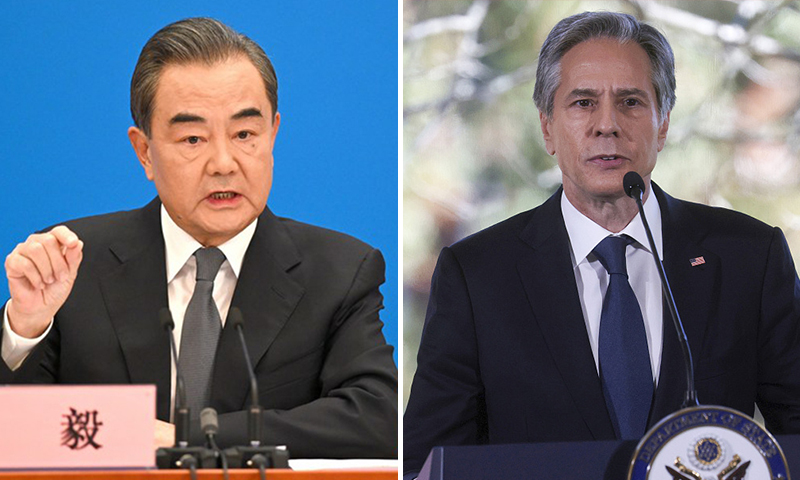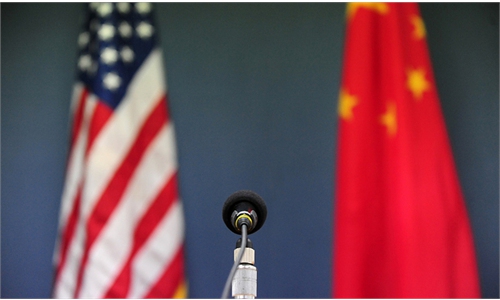Wang Yi talks to Blinken ahead of Xi-Biden summit, warns US not to support ‘Taiwan independence’

Chinese State Councilor and Foreign Minister Wang Yi (left) and US Secretary of State Blinken.
Chinese State Councilor and Foreign Minister Wang Yi on Saturday spoke with US Secretary of State Antony Blinken on phone as both sides prepare for a virtual meeting of Chinese President Xi Jinping and US President Joe Biden scheduled on November 16 Beijing Time. Wang stressed the importance of "meeting each other half way" and warned the US to not support "Taiwan independence."
The widely-expected Xi-Biden meeting is not only a major event in China-US ties, but also in international relations, Wang said. The people of the two countries and the international community hope that the meeting will yield results beneficial to both countries and the world at large. The two heads of state play a key role in steering bilateral ties, Wang said.
The two sides should meet each other halfway to ensure a smooth and successful meeting, to bring China-US relations back on track and aim for sound and stable development, Wang said.
Xi will meet with Biden via video link on the morning of November 16 (Beijing Time), Chinese Foreign Ministry spokesperson Hua Chunying said on Saturday. It is seen as a positive sign for improving fraught bilateral ties.
The call was meant to make sure both sides are on the same page about the tone and the topics of the Xi-Biden summit and to hammer out the details, Lü Xiang, a research fellow at the Chinese Academy of Social Sciences, told the Global Times.
Blinken said the video meeting between the two leaders will be closely watched by the world and the two sides have made full preparations for it and made positive progress. The US looks forward to sharing its views on bilateral relations with China on the basis of mutual respect, and jointly sending a strong signal to the world, according to the statement released by Chinese Foreign Ministry on Saturday.
The Xi-Biden meeting will define the nature of China-US relations. The Chinese side will restate that its overall strategy for bilateral relations which has been consistent for decades. The talks are expected to send a positive signal for bilateral relations and the world, according to Lü.
The phone conversation between Wang and Blinken was a prelude to the leaders' meeting, outlining principles and expected results of the upcoming talk. Wang made it clear that bilateral relations can only move forward steadily if the US respects China's core interests, Li Haidong, professor at the Institute of International Relations of the China Foreign Affairs University, told the Global Times.
Wang expressed China's opposition to US' recent wrong words and actions on the Taiwan question in the phone talk, reaffirming China's solemn position on the issue related to national sovereignty.
Wang said history and reality have fully proved that "Taiwan independence" is the biggest threat to peace and stability in the Taiwan Straits, and any connivance and support for separatists' forces is a breach of peace in the Straits and will eventually bear the consequences of its own actions.
If the US really wants to safeguard peace across the Taiwan Straits, it should firmly and unequivocally oppose any separatist act, honor its solemn commitment made in the three China-US Joint Communiqués, implement the one-China policy, and stop sending wrong signals to secessionist forces, Wang stressed.
America's recent soft-spoken statements suggest an easing of fraught tensions, but US' increasingly provocative actions still add to the uncertainty. The Taiwan question will be covered, and there will be a warning from China at the highest level not to push the Taiwan question to the brink of confrontation, Lü said.
The two sides also exchanged views on energy security, climate change, the Iran nuclear issue, and agreed to maintain dialogue on addressing various global challenges.
The virtual meeting is expected to focus on issues of common concern such as the situation across the Taiwan Straits, human rights, climate cooperation and bilateral trade, which will all have significant impact on Biden's next China policy. China will give its clear position on these issues, Lü said.


